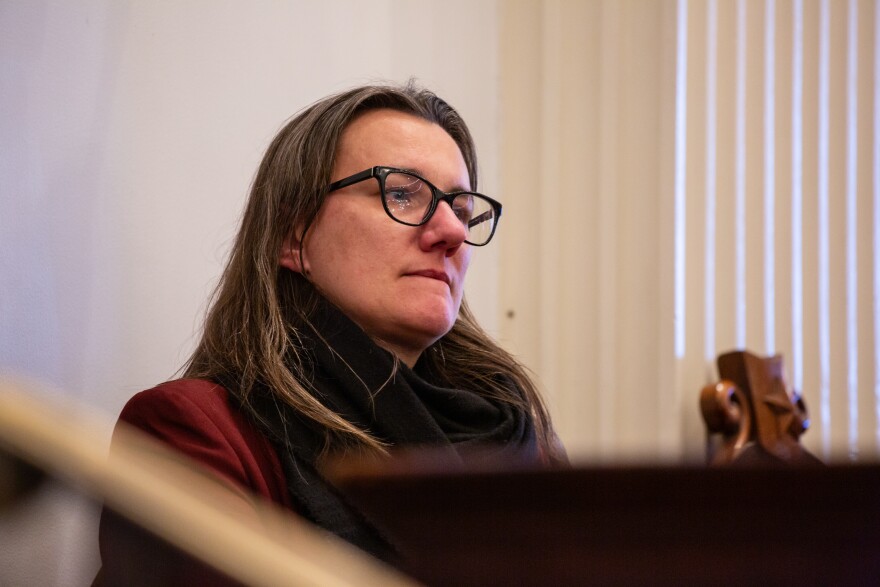Elected officials across the political spectrum have said they want to deliver major policy changes in education, housing and other areas, but six weeks into the 2025 legislative session, lawmakers haven’t made much progress toward those goals.
��������’s Capital Bureau has been following the action �� or lack thereof �� in Montpelier. And in this week’s edition of Capitol Recap, reporters Lola Duffort and Peter Hirschfeld assess where things are, and why they’re moving so slowly.
This interview was produced for the ear. We highly recommend listening to the audio. We’ve also provided a transcript, which has been edited for length and clarity.
Peter Hirschfeld: Lola, you and I, we’ve been through a few legislative sessions. I think we’ve both come to understand they each have their own cadence, right? Some move very quickly. Some less so. But this one feels uniquely slow, no?
Lola Duffort: Yeah, it feels like we’re in a little bit of a rut. Of course it’s always darkest before the dawn. But yeah, it feels different, and there are a lot of really good reasons for that.
We have a lot of freshman lawmakers who are still trying to wrap their heads around the legislative process. And we also have a majority that is still a majority, but that has experienced this really strong rebuke from the voters and is kind of struggling to find its footing in this new context.
Peter Hirschfeld: And, a new presidential administration that has been a particularly jarring transition for a lot of lawmakers in the building, of both parties frankly. And it’s been fascinating to me the extent to which the fire hose of information and news coming out of D.C. is having an almost paralyzing effect on business in Montpelier.
Lola Duffort: I’d say that’s true, absolutely.

Peter Hirschfeld: The dam will break. It has to. I guess the question is, is there going to be anything behind it when it does? On the education front at least, we heard some rhetoric from Senate President Phil Baruth this week that didn’t exactly seem to put wind behind the sails of Gov. Phil Scott’s big plan to transform the education system.
Lola Duffort: Indeed �� Phil Baruth did make clear he does still want to see reform happen, but he threw cold water on Phil Scott’s idea when it comes to school choice. And the reason why that matters for, sort of, larger reform talks is that you have to figure out what to do about school choice if you’re going to do regional consolidation, which has been a really big part of these conversations and is a keystone of the governor’s proposal. And Phil Baruth also doesn’t have an alternative plan for that and has implied pretty strongly that he’s kind of fine if we just do a funding fix and we don’t touch consolidation.
Meanwhile, in the other chamber, House Speaker Jill Krowinski also said she did not like the governor’s school choice proposal, but said she does want to see funding happen with some sort of governance operational reform.

Peter Hirschfeld: All or nothing, right?
Lola Duffort: Right. She thinks that if we just change how we pay for schools and we don’t do anything else differently, we might break the system, which is something I’ve heard a lot from education officials.
And so we have really big differences of opinion now between the chambers, and also between the legislative branch and Scott. And we haven’t yet heard sort of, plan Bs that might thread a needle between all of those.
Peter Hirschfeld: And I know this sounds like an insignificant detail in the context of a policy transformation of the size and scope that we’re talking about in education right now, but we learned this week that Tax Commissioner Craig Bolio is leaving his position, moving to Massachusetts.
Bolio has been a really important bridge builder between the Republican administration and the Democratically controlled Legislature. And not having him around could make it harder to arrive at the consensus that elected officials are going to need in order for something big to happen this year.
Lola Duffort: Yeah, I think that might sound like palace intrigue to a lot of people. But things don’t happen at the Statehouse in a partisan environment unless there’s someone who can be trusted by both sides.

Peter Hirschfeld: We are seeing some things happen on the legislative front, but it’s fascinating �� in a lot of cases it’s looking at laws that already exist and changing them, revising them, repealing them.
We’re seeing that with Raise the Age right now. This is a first-in-the-nation law that seeks to treat offenders as old as 20 as juveniles, acknowledging that young brains are still developing even after they turn 18. Phil Scott wants to repeal that law. Democratic lawmakers have been huge defenders of that up until this point. But it looks like they are going to go along with at least a pause in that, and push back the enactment for two years, much to the dismay of some criminal justice reform advocates.
Lola Duffort: And I would say that there were some Democrats �� not all Democrats loved criminal justice reform. But yeah, I think whether or not it’s climate or education or public safety, Democrats are not exactly paving their own way so much as they’re responding to Phil Scott.
Peter Hirschfeld: And a fascinating turn after four years where we saw Democrats use that building to advance some really enormous policy. And they did it on their own. It all came from them.
Lola Duffort: Yeah, it’s an incredibly different context.

Have questions, comments or tips? .






